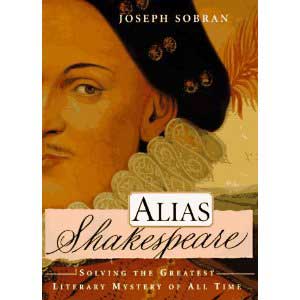
FGF E-Package
The Reactionary Utopian (classic)
May 14, 2011
Honoring the True Bard
A classic by Joe Sobran
fitzgerald griffin foundation
The year 2000 marked the 450th anniversary of the author of the Shakespeare works, Edward de Vere, Earl of Oxford, who was born in April 1550.
On the one hand, the academic Shakespeare scholars hotly deny Oxford’s authorship. On the other hand, they have no answer to the mounting evidence for Oxford.
A few years ago an independent scholar named Roger Stritmatter found that Oxford’s personal copy of the Bible is heavily marked, and that hundreds of verses Oxford marked correspond to verses cited in the Shakespeare plays. For example, Oxford underlined the verse in which the shaft of Goliath’s spear is compared to “a weaver’s beam.” In The Merry Wives of Windsor, Sir John Falstaff boasts: “I fear not Goliath with a weaver’s beam.” Coincidence? If so, there are a hundred such coincidences pointing to Oxford.
In my 1997 book Alias Shakespeare I showed that the Shakespeare Sonnets likewise describe Oxford, not William of Stratford. The poet twice mentions that he is “lame,” for example; we have no indication that William was ever lame, but several of Oxford’s letters refer to his lameness, and one jokes about his being “a lame man.”
The scholars who attacked my book had no real answer to this. Some suggested that the Sonnets are fictional; others suggested that if we had more information about William, we might find that he too matches the poet’s self-portrait. But such answers tacitly concede that the information we already have matches Oxford.
But why does it matter who “Shakespeare” was, as long as we have the plays? Well, it matters tremendously, of course. As a simple matter of justice, we want to honor the right man for giving us these tremendous works. Besides, biographers and scholars need to know who the author was for purposes of understanding the relation between his life and his work.
And there is a further reason. Oxford became “Shakespeare” fairly late in his life, in 1593, when he was already 43 and had only 11 years to live. I believe he had already written many other works under other aliases, and we should make every effort to discover the full canon of his works. I have already claimed the 1595 sonnet cycle Emaricdulfe for him; it contains 200 verbal parallels with the Shakespeare works, which the orthodox scholars have completely failed to notice.
How could the experts overlook evidence which has been lying in plain sight for four centuries? It’s easy. The “experts” assume they already know everything there is to know about Shakespeare, so instead of looking for new data they keep plowing old ground and repeating themselves. Shakespeare “scholarship” is largely an echo-chamber of mutual quotation. The pity is that the “experts” are actually hostile to new discoveries, especially if those discoveries are made by outsiders and amateurs.
I am convinced that Oxford was consciously following in the footsteps of his uncle, Henry Howard, Earl of Surrey, another great poet and pioneer of the English sonnet, who had been beheaded by Henry VIII in 1547. I recently found a previously unobserved link between Surrey and “Shakespeare.”
In the play Sir Thomas More, now generally agreed to be at least partly Shakespearean, Surrey appears as a major character; his distinction as a poet is mentioned. But in fact, the real Surrey was still in his teens when the historical More was beheaded in 1535; he had yet to make his name as a poet.
So “Shakespeare” had to take liberties with the facts to insert Surrey into the play. If “Shakespeare” was Oxford, the reason seems obvious: he wanted to honor his famous uncle by associating him with another great man of letters, More, who was also killed by order of Henry VIII.
Oxford may have hidden his authorship, but he left many such personal marks on his works — literary fingerprints, as it were, by which we may detect his hand.
In the future, I will try to show what the academic scholars have missed: the real life and career of the greatest English poet, with dozens of works never before ascribed to “Shakespeare.” As for William of Stratford, he probably never even read the works he is supposed to have written.
The Reactionary Utopian archives
Copyright © 2011 by the Fitzgerald Griffin Foundation. All rights reserved. This column was published originally by Griffin Internet Syndicate on February 24, 2000.
Joe Sobran's book, Alias Shakespeare: Solving the Greatest Literary Mystery of All Time (The Free Press (a division of Simon and Schuster, 1997, 320 pages), is out-of-print but copies can usually be found at Alibris.com and Amazon.com
Joe Sobran was an author and a syndicated columnist. See bio and archives of some of his columns.
Watch Sobran's last TV appearance on YouTube.
Learn how to get a tape of his last speech during the FGF Tribute to Joe Sobran in December 2009.
To subscribe to or renew the FGF E-Package, or support the writings of Joe Sobran, please send a tax-deductible donation to the:
Fitzgerald Griffin Foundation
344 Maple Avenue West, #281
Vienna, VA 22180
1-877-726-0058
publishing@fgfbooks.com
or subscribe online.
@ 2025 Fitzgerald Griffin Foundation
